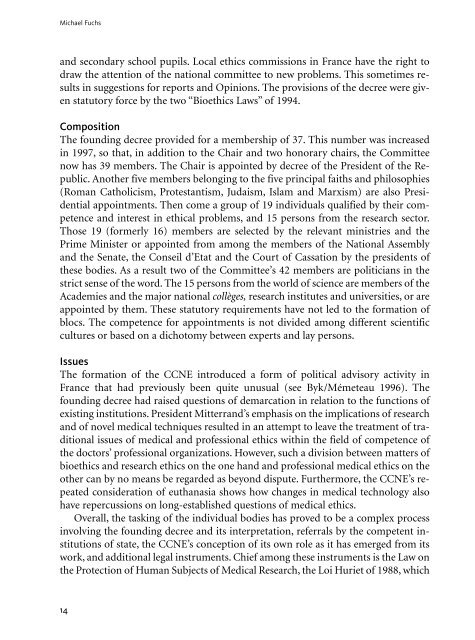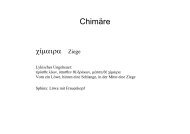Michael Fuchs National ethics councils - Deutscher Ethikrat
Michael Fuchs National ethics councils - Deutscher Ethikrat
Michael Fuchs National ethics councils - Deutscher Ethikrat
You also want an ePaper? Increase the reach of your titles
YUMPU automatically turns print PDFs into web optimized ePapers that Google loves.
<strong>Michael</strong> <strong>Fuchs</strong> <strong>National</strong> <strong>ethics</strong> <strong>councils</strong>. Their backgrounds, functions and modes of operation compared<br />
and secondary school pupils. Local <strong>ethics</strong> commissions in France have the right to<br />
draw the attention of the national committee to new problems. This sometimes results<br />
in suggestions for reports and Opinions. The provisions of the decree were given<br />
statutory force by the two “Bio<strong>ethics</strong> Laws” of 1994.<br />
Composition<br />
The founding decree provided for a membership of 37. This number was increased<br />
in 1997, so that, in addition to the Chair and two honorary chairs, the Committee<br />
now has 39 members. The Chair is appointed by decree of the President of the Republic.<br />
Another five members belonging to the five principal faiths and philosophies<br />
(Roman Catholicism, Protestantism, Judaism, Islam and Marxism) are also Presidential<br />
appointments. Then come a group of 19 individuals qualified by their competence<br />
and interest in ethical problems, and 15 persons from the research sector.<br />
Those 19 (formerly 16) members are selected by the relevant ministries and the<br />
Prime Minister or appointed from among the members of the <strong>National</strong> Assembly<br />
and the Senate, the Conseil d’Etat and the Court of Cassation by the presidents of<br />
these bodies. As a result two of the Committee’s 42 members are politicians in the<br />
strict sense of the word. The 15 persons from the world of science are members of the<br />
Academies and the major national collèges, research institutes and universities, or are<br />
appointed by them. These statutory requirements have not led to the formation of<br />
blocs. The competence for appointments is not divided among different scientific<br />
cultures or based on a dichotomy between experts and lay persons.<br />
Issues<br />
The formation of the CCNE introduced a form of political advisory activity in<br />
France that had previously been quite unusual (see Byk/Mémeteau 1996). The<br />
founding decree had raised questions of demarcation in relation to the functions of<br />
existing institutions. President Mitterrand’s emphasis on the implications of research<br />
and of novel medical techniques resulted in an attempt to leave the treatment of traditional<br />
issues of medical and professional <strong>ethics</strong> within the field of competence of<br />
the doctors’ professional organizations. However, such a division between matters of<br />
bio<strong>ethics</strong> and research <strong>ethics</strong> on the one hand and professional medical <strong>ethics</strong> on the<br />
other can by no means be regarded as beyond dispute. Furthermore, the CCNE’s repeated<br />
consideration of euthanasia shows how changes in medical technology also<br />
have repercussions on long-established questions of medical <strong>ethics</strong>.<br />
Overall, the tasking of the individual bodies has proved to be a complex process<br />
involving the founding decree and its interpretation, referrals by the competent institutions<br />
of state, the CCNE’s conception of its own role as it has emerged from its<br />
work, and additional legal instruments. Chief among these instruments is the Law on<br />
the Protection of Human Subjects of Medical Research, the Loi Huriet of 1988, which<br />
14<br />
deals comprehensively – that is to say, with a wider field of application than the German<br />
Medicinal Products and Medical Devices Laws – with the functions and status<br />
of <strong>ethics</strong> commissions in such research projects. In addition, this Law put an end to<br />
the debate on whether the existing CCNE ought also to serve as a central commission<br />
for research projects involving human subjects, either as a body to which appeals<br />
could be directed or in order to rule on particularly important or complex cases. The<br />
decision that the regional commissions have sole responsibility for these matters<br />
means that the CCNE must concentrate on general issues. Consideration of the<br />
Opinions hitherto published, however, reveals a broad spectrum, from the very first<br />
Avis, on the sampling of dead human embryonic and fetal tissue, to the eightieth, on<br />
the role of occupational medicine. It extends from the major international issues<br />
such as embryo research or cloning, via psychological research and oncological studies,<br />
to the ethical aspects of neurosurgery, which have hitherto not, or not systematically,<br />
been addressed in bio<strong>ethics</strong>, let alone by advisory bodies.<br />
Mode of Operation<br />
The Committee appoints rapporteurs for the subject-matter under consideration,<br />
who are responsible for the scientific question, the research problem or the ethical issue<br />
concerned. A working party made up of members of the Committee and external<br />
specialists is formed, and begins by determining whether the issue in hand is a<br />
genuine scientific problem and whether it has not already been examined by the<br />
Committee or is not covered by existing law. The working party then approaches the<br />
documentation centre (Centre de Documentation en Ethique) of the INSERM (Institut<br />
<strong>National</strong> de la Santé et de la Recherche Médicale); the founding decree provides<br />
that the CCNE shall receive administrative and technical support from this body. In<br />
particular, the INSERM is required to provide the Ethics Committee with a documentation<br />
and information centre on the <strong>ethics</strong> of the life and health sciences. Next<br />
comes the ethical debate, which may extend over several months. Its outcome is a scientific<br />
report, an ethical report and a draft Opinion (Avis) which are published and<br />
forwarded to the Committee’s Technical Department and to a 14-member subcommittee.<br />
The latter submits the text, after examination and discussion, to the Plenary<br />
Committee, which meets at approximately six-weekly intervals to consider and discuss<br />
the drafts. It then returns the text to the working party for revision. In most cases,<br />
the Committee finally adopts the report together with the Opinion unanimously.<br />
However, dissenting positions are allowed for and have in some cases been expressed,<br />
attached to the report and published with it. In some cases, areas of consensus and<br />
dissent are recorded, but not the results of a vote on dissenting positions.<br />
In addition to the working parties assembled for the purpose of compiling an<br />
Avis, there is a permanent working group on molecular biology and reproductive<br />
techniques and another on the neurosciences.<br />
15




